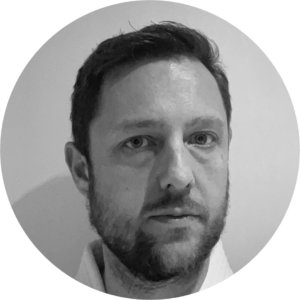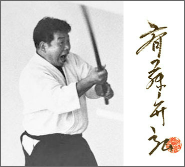
When did you start Aikido and why?
Martial arts and Aikido have always been a part of my life. I come from a traditional Gypsy family so boxing is in our DNA. However, my father served in the Royal Marines and then the Police Service where he became a self-defence instructor teaching Aikido to police officers and other instructors. When I was very young my friends and I would rush at him and he would sit in seiza laughing as he threw us all over the room.
When I was about 10 years old, I was returning from dinner with my parents and sister when we were confronted by a group of drunken males. They threw bricks at our car causing us to stop. My father got out and confronted the group (5 or 6 males). I instinctively got out in support of my father and witnessed first-hand the power and efficiency of martial Aikido. My father made quick work of the entire group without suffering so much as a bruise. Those of the group still conscious begged him for forgiveness and we went on our way. I knew in that moment I wanted that power.
As a young man I took up boxing, jujutsu and kendo but I struggled to find aikido clubs near to me and I lived away from home so my father was not an option. I worked as a nightclub bouncer in central London, joined the infantry in the British Army, and then became a police officer. So, I found an increasing need to have practical skills. Over this period I tried each of the main schools of aikido including Yoshinkan, Tomiki, and Aikikai.
Eventually I found great teachers in Fabiano Lemes de Oliveira Sensei and Dominique Guenroc Sensei, with whom I have trained since 2011. I am now at the happiest time in my Aikido journey having transitioned to Iwama Ryu under Tony Sargeant Shihan in 2021.
What are some of your main memories in Aikido?
My most fondest memories have been travelling and meeting wonderful people from across the world and training together in friendship. I was fortunate to able to train under Yoshimitsu Yamada Shihan and Donovan Waite Shihan from the USAF who have both sadly passed on now. In recent years, I really enjoy attending the seminars hosted by Tony Sargeant Shihan where all are welcome. Lastly, unlike most (thankfully), I can point to multiple occasions where I have used Aikido in real-life scenarios.
What are your personal goals in Aikido?
My goals have matured with age. When I witnessed my father dispatching multiple attackers I formed the goal of achieving the same technical proficiency he had. I have seen similar or greater ability demonstrated by Tony Sargeant Shihan. If you serve as uke to him you KNOW what I mean. So this goal remains unchanged although I am now wise and humble enough to acknowledge I may never get there.
That being said, my goals now incorporate taking from Aikido more holistic benefits in terms of mental and physical refinement, and improving my character as a human being. I am on the first steps to making Aikido part of daily life beyond practicing motor skills.
Finally, I see Aikido as a precious gift with major historical/cultural significance and benefits to human beings. My main goal should be to preserve and spread the art as transmitted from O Sensei to Saito Sensei and onwards.
Why do you think Iwama Aikido is so unique?
I feel I am qualified to answer this as I have trained in all of the major schools. I also train separately in Daito-Ryu Aikijujutsu and Iaido.
All styles and variations have their benefits. However, Iwama Ryu is the only style that encourages pressure testing and resistance. Therefore, in my opinion it is the most effective style to train in if you want to rely on aikido in real-life scenarios.
What can Aikido offer people, in your opinion?
With commitment and regular practice Aikido will equip an individual with certain martial skills that can be effective in physical altercations. What it will not do is make a person invincible and practitioners should be guarded against this form of complacency. O Sensei said Aikido is anywhere between 70-90% atemi, so practice your left hooks people!
Aikido offers a method of maintaining/improving physical and mental health, and experiencing Zen – which is of great benefit when we are all living in such a hectic and stressful world.
Perhaps best of all, you will meet other people who are accepting and inclusive and appreciate you for who you are.
How long have you been training?
Technically since I was about 7 years old, formally since 2002.
Where have you travelled?
I have practiced Aikido throughout the UK, Spain, the USA, Latin America, and The Far East.


